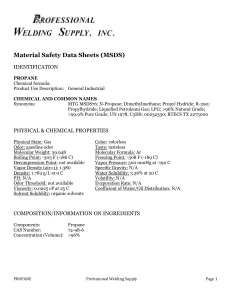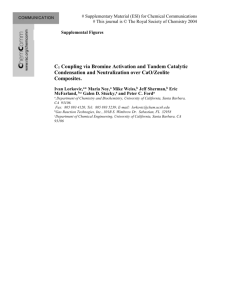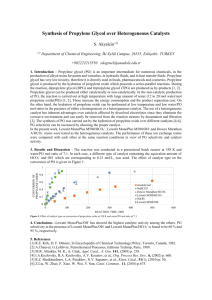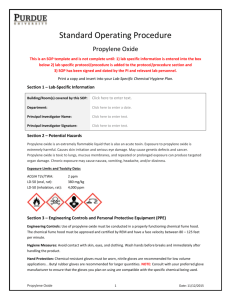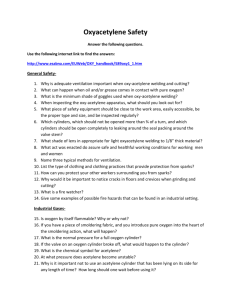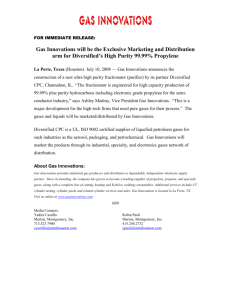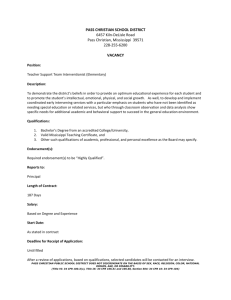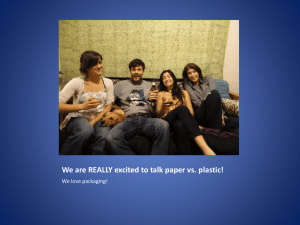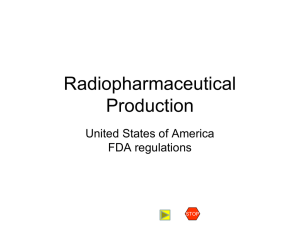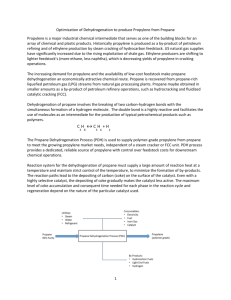PROPYLENE - Professional Welding Supply
advertisement
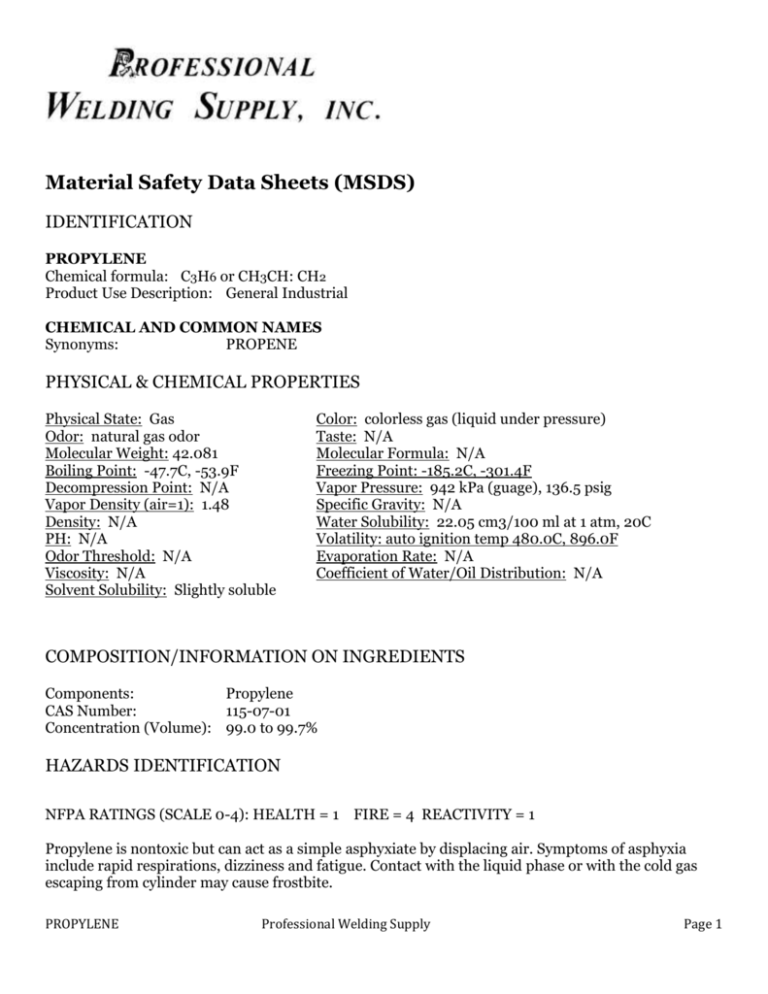
Material Safety Data Sheets (MSDS) IDENTIFICATION PROPYLENE Chemical formula: C3H6 or CH3CH: CH2 Product Use Description: General Industrial CHEMICAL AND COMMON NAMES Synonyms: PROPENE PHYSICAL & CHEMICAL PROPERTIES Physical State: Gas Odor: natural gas odor Molecular Weight: 42.081 Boiling Point: -47.7C, -53.9F Decompression Point: N/A Vapor Density (air=1): 1.48 Density: N/A PH: N/A Odor Threshold: N/A Viscosity: N/A Solvent Solubility: Slightly soluble Color: colorless gas (liquid under pressure) Taste: N/A Molecular Formula: N/A Freezing Point: -185.2C, -301.4F Vapor Pressure: 942 kPa (guage), 136.5 psig Specific Gravity: N/A Water Solubility: 22.05 cm3/100 ml at 1 atm, 20C Volatility: auto ignition temp 480.0C, 896.0F Evaporation Rate: N/A Coefficient of Water/Oil Distribution: N/A COMPOSITION/INFORMATION ON INGREDIENTS Components: Propylene CAS Number: 115-07-01 Concentration (Volume): 99.0 to 99.7% HAZARDS IDENTIFICATION NFPA RATINGS (SCALE 0-4): HEALTH = 1 FIRE = 4 REACTIVITY = 1 Propylene is nontoxic but can act as a simple asphyxiate by displacing air. Symptoms of asphyxia include rapid respirations, dizziness and fatigue. Contact with the liquid phase or with the cold gas escaping from cylinder may cause frostbite. PROPYLENE Professional Welding Supply Page 1 FIRST AID For inhalation, skin and/or eye contact (liquid): Breathing: Inhalation. Provide fresh air, or give artificial respiration if not breathing, mouth to moth preferred. If breathing is difficult, give oxygen. Get immediate medical attention. Skin: Frostbite. Rinse with room temperature water, do not remove clothes, refer for medical attention. Eyes: Frostbite. Rinse with water lukewarm water for at least 15 minutes, then seek emergency medical attention. FIRE FIGHTING MEASURES The only safe way to extinguish a propylene fire is to stop the flow of gas. IF the flow cannot be stopped, let the fire burn out while cooling the cylinder and the surroundings using a water spray. Personnel may have to wear approach-type protective suits and positive pressure self-contained breathing apparatus. Firefighters’ turnout gear may be inadequate. Cylinders exposed to fire may rupture with violent force. Extinguish surrounding fire and keep cylinders cool by applying water from a maximum possible distance with a water spray. Flammable gases may spread from a spill after the fire is extinguished and be subject to re-ignition. ACCIDENTAL RELEASE MEASURES Shut off all ignition sources and ventilate the area. For controlling large flows, personnel may have to wear approach-type protective suits and self-contained breathing apparatus. HANDLING AND STORAGE Cylinders should be stored and used in dry, well ventilated areas away from sources of heat or ignition. Do not store with oxidizers, secure the cylinder to prevent it from falling or being knocked over, install check valves or traps to prevent suckback to the cylinder, ground all lines and equipment, leak check the lines and equipment, and have an emergency plan covering steps to be taken in the event of an accidental release. EXPOSURE CONTROLS/PERSONAL PROTECTION VENTILATION: Provide local exhaust ventilation system. Ensure compliance with applicable exposure limits. EYE PROTECTION: Safety glasses should be worn. PROPYLENE Professional Welding Supply Page 2 RESPIRATORY PROTECTION: Approved respiratory equipment must be worn when airborne concentrations exceed safe levels. SKIN PROTECTION: No special equipment is required. Gloves are recommended for cylinder handling. CLOTHING: Protective clothing is not required. STABILITY AND REACTIVITY Stable at normal temperatures and pressure. Protect from physical damage and heat. Containers may rupture or explode if exposed to heat. Will not polymerize. TOXICOLOGICAL INFORMATION Simple asphyxiate. ECOLOGICAL INFORMATION Fish, invertebrate, algal toxicity: No data available. Biodegradation: No data available. DISPOSAL CONSIDERATIONS Dispose in accordance with all applicable regulations. TRANSPOSRT INFORMATION Proper Shipping name: Propylene U.S. DOT CFR ID NUMBER: UN1077 HAZARD CLASS: 2.1 LABELING REQUIREMENTS: 2.2 REGULATORY INFORMATION U.S. REGULATIONS CERCLA Sections 102a/103 Hazardous Substances (40 CFR 302.4): Not regulated SARA Title III Section 302 Extremely Hazardous Substances (40 CFR 355 Subpart B): Not regulated SARA Title III Section 304 Extremely Hazardous Substances (40 CFR 370 Subparts B and C): Acute: Yes Chronic: No Fire: No Reactive: No Sudden Release: Yes PROPYLENE Professional Welding Supply Page 3 SARA Title III Section 313 (40 CFR 372.65): Not regulated OSHA Process Safety (29 CFR 1910.119): Not regulated STATE REGULATIONS California Proposition 65: Not regulated CANADIAN REGULATIONS WHMIS Classification: A NATIONAL INVENTORY STATUS U.S. Inventory (TSCA): Listed on inventory TSCA 12(b) Export Notification: Not listed Canada inventory (DSL/NDSL): Listed on inventory PROPYLENE Professional Welding Supply Page 4
